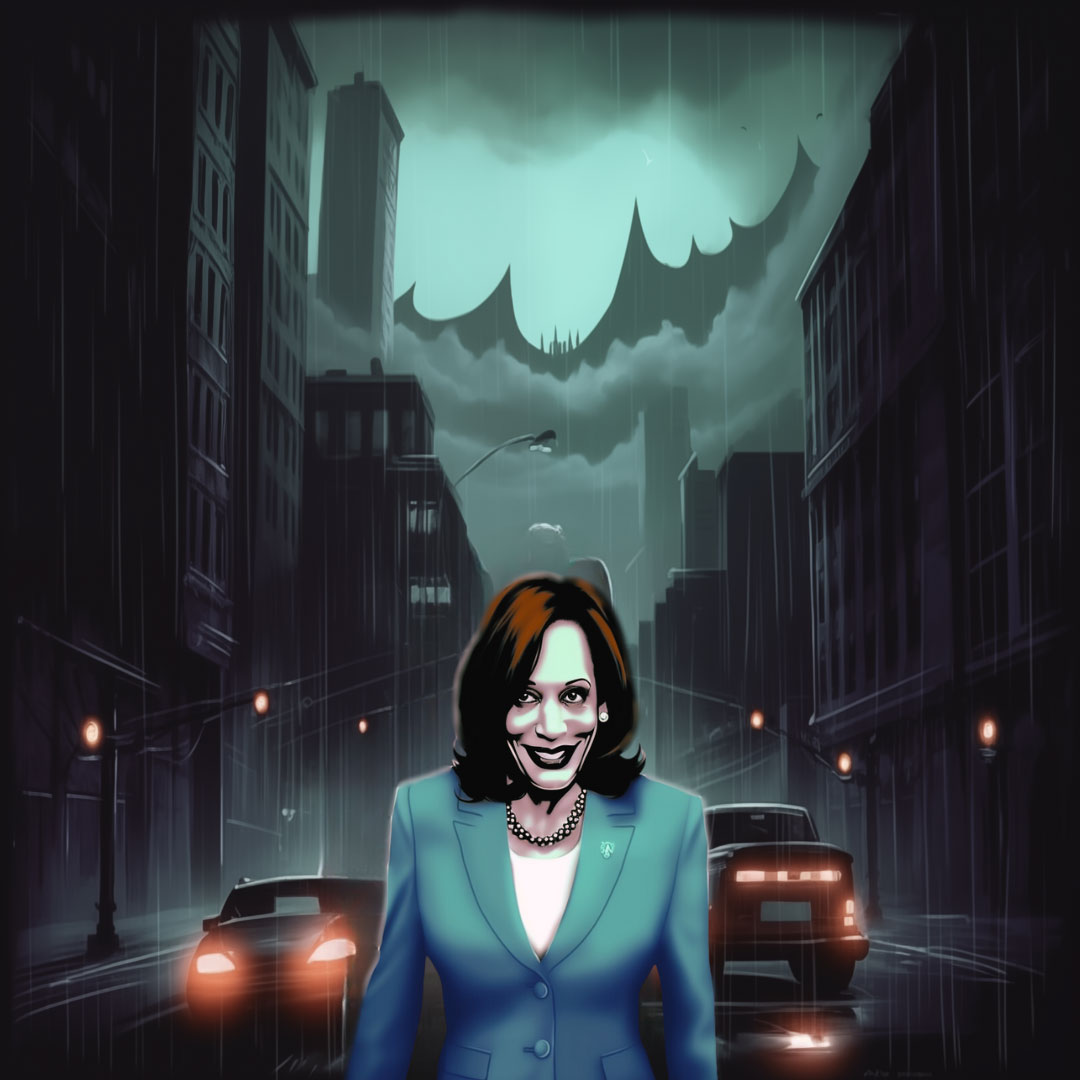Rising from her position as California’s first female Attorney General to U.S. Senator and eventually Vice President, Kamala Harris’s ascent masks a troubling past. Amid promises of progress and justice, Harris’s actions reveal the chasm between rhetoric and reality. Often noted for her frequent giggles and vague responses punctuated by the word “unburdened,” she has been cast by some as a distant figure within Biden’s administration. Despite their differences, both Harris and Biden share a similar approach to governance, each regarded as a political chameleon: fundamentally hawkish yet willing to adopt a more dovish stance when it serves the system’s agenda. Furthermore, Harris’s far-left background, marked by associations with Marxist and Maoist ideologies makes her far from benign, and her potential rise to the presidency could pose a significant threat to the United States.
Rated as one of the most liberal politicians in 2019, Kamala Harris openly endorses modern expressions of Marxist ideology, positioning herself as a pro-abortion activist and an advocate for woke culture. As Jordan Peterson points out, Marxism is an antichristian theology at its core, rooted in the belief that power is the ultimate force, and that the “God of Power” is justified in ruling. Peterson states that this compelling ideology thrives on resentment, and hinges on dividing society between victims and oppressors. He also highlights how Marxism taps into the darkest human emotions, and this is why it resonates so easily. Life offers endless reasons to feel burdened, making this philosophy an easy sell.
Eric Weinstein, a mathematician, economist, and influential thinker, warns that mocking Kamala Harris for her oft-ridiculed quote, “What can be, unburdened by what has been” could be a critical mistake. As the man who coined the term “Intellectual Dark Web”—a group featuring prominent figures like Jordan Peterson, Sam Harris, and Joe Rogan, who engage in discussions on controversial topics outside the bounds of mainstream media—Weinstein asserts that Harris’s phrase holds a far more profound implication than it seems. It basically says: “you have to wipe out what has been for the new to arrive”. He draws parallels to Karl Marx’s ideology, pointing out that such rhetoric echoes historical efforts to obliterate collective memory to reshape society, as seen in Mao’s Cultural Revolution. Weinstein warns that this is profoundly dangerous, as it seeks to erase the lessons of the past, dismissing them as burdens that must be forgotten. It’s like reformatting the brain for a supposed “fresh start.” The true danger, he argues, lies in the seductive allure of the blank slate.
Many voters remain uncertain about who Kamala Harris truly is, largely due to her shifting positions on key issues. She once championed looser immigration policies, yet now campaigns for tighter restrictions. Similarly, she previously backed Medicare for All but has since stepped away from that commitment. This inconsistency seemingly aimed to mask her brainless behavior, only fueled voter doubts about Harris’s genuine beliefs and political reliability. After withdrawing from the 2024 presidential race to endorse Donald Trump, Robert Kennedy Jr. delivered a sharp critique of Harris, underscoring the glaring lack of substance in her core values and policy agenda:
“Instead of showing us her substance and character, the DNC, and its media organs, engineered a surge of popularity based upon, well, nothing. No policies, no interviews, no debates, only smoke and mirrors.”
While she may attempt to align herself with mainstream Democratic ideals, Kamala Harris’s political roots are deeply intertwined with a more shadowy, Marxist-influenced upbringing. Her family is widely known for its deep roots in communist ideologies, with her parents actively participating in the Afro-American Association, a Berkeley-based group that admired Marxist revolutionaries like Fidel Castro and Che Guevara. This organization played a key role in radicalizing figures within the Black Power movement, later linked to the Black Panther Party, which received support from communist China. Harris’s father, Donald Harris, is a self-proclaimed Marxist and economics professor at Stanford University, whose political views shaped her worldview from an early age. Her mother, Shyamala Gopalan, was also involved in radical political circles, while her sister, Maya Harris, is reportedly connected to Steve Phillips, a Marxist-Leninist member of the League of Revolutionary Struggle, a pro-Chinese communist group. Phillips used his considerable financial resources to back leftist political campaigns, including Barack Obama’s, and has been a major financial supporter of Harris’s political career. These family connections to communist organizations and pro-China groups underscore Harris’s deep ties to radical leftist movements, cementing her alignment with these ideologies. Should Harris continue to rise in power, critics argue that her policies could undermine American democracy and strengthen foreign adversaries like China.
As Harris’s political career progressed, she maintained connections with several individuals linked to far-left movements. Her rise was notably influenced by her relationship with Willie Brown, a prominent California politician and long-time advocate of socialist causes. Brown used his influence to advance her career and supported her progressive views. He is clear about Harris’s strategy on embracing unclear ideology: “If she keeps people continually guessing, then she can adjust the interpretation of your guess every time she sees you.”
Another figure heavily tied to Willie Brown was Jim Jones, the infamous Peoples Temple leader responsible for the 1978 Jonestown massacre that claimed over 900 lives. Jones’s skill in mobilizing large groups significantly boosted left-wing campaigns, with Brown and other Marxist leaders providing him legitimacy and shielding him from scrutiny. Daniel Flynn’s book, “Cult City: Jim Jones, Harvey Milk, and 10 Days That Shook San Francisco”, delves into the connections between Jim Jones and several Democratic representatives, including Willie Brown. As Jones’s popularity grew, particularly within Black communities, his sermons shifted from religious themes to calls for social activism and violent revolution. His final words before the Jonestown massacre were: “Take our life from us. We laid it down, we got tired. We didn’t commit suicide; we committed an act of revolutionary suicide protesting the conditions of an inhumane world.” This line captures the tragic manipulation at play. Jones convinced his followers that they were burdens to society and that living would only bring further suffering. As a self-proclaimed Marxist, Jones weaponized fear and despair to control and exploit his followers, much like a twisted Scarecrow figure. In a connection more fitting of a villainous plot, both Jim Jones and the Giggler shared the same mentor: Willie Brown.
Harris’s constant giggling and seemingly harmless remarks can act as a subliminal mantra for individuals who feel victimized, particularly women and members of the LGBTQ+ community. Her siren song serves as a seductive tool, subtly designed to manipulate and attract followers, much like the tactics used by the Scarecrow. In Batman Begins (2005), the character of Dr. Jonathan Crane is a psychologist and a professor at Gotham University who secretly operates as a villainous figure. Crane’s alter ego, the Scarecrow, is a masked villain who uses a fear-inducing toxin as a weapon, targeting deep human vulnerabilities and tapping into primal fears. This toxin brings suppressed anxieties to the surface in a distorted, exaggerated form, forcing victims to confront their deepest insecurities and fears, ultimately destabilizing their sense of reality. As far-fetched as it may seem, Harris’s strategy resembles that of the Scarecrow, acting as a smoke screen that sows seeds of uncertainty and confusion through puzzling, lame statements. Like the Scarecrow’s goal of creating mass panic to unravel the fabric of Gotham, Harris could be viewed as part of a broader strategy to disorient and divide, eroding the public’s faith in a thriving future. She may unknowingly be employing these tactics, perhaps even as a victim of communist indoctrination herself—a pattern that reflects the self-perpetuating nature of Marxist influence.
Often hailed as the “Female Obama”, Kamala Harris was granted the elite’s support, but was rated as one of the most unpopular vice presidents since polling began. Just as some villains reveal how even the most autonomous antagonists can be pawns in a grander scheme, Harris has proven to be an easy puppet. Unfortunately, it’s a no win situation for the population itself, just like the walk of death perpetrated by Jim Jones. In essence, Kamala Harris is a pivotal figure in what seems to be a deliberate, leftist agenda to undermine the U.S. political system from within and push the U.S. toward socialism. Whether or not the claims about her radical connections are fully accurate, they force us to confront serious questions about the role of ideology in American politics and the potential risks of electing leaders with such associations. Authoritarian Marxism stifles critical thought by enforcing ideological conformity, dismissing alternative opinions as flawed or bourgeois, thereby exacerbating social divisions. Today’s radical left appears determined to ensure that no one wins: except their agenda.
Advocating for radical policies like open borders, hiking taxes, woke culture, climate activism, wealth redistribution, and universal healthcare—even for illegal immigrants—will likely result in instability and chaos rather than achieving true equity and inclusion. The Biden-Harris administration has openly embraced censorship and cancel culture as tools to impose their ideological paradigms, aiming to reshape society free from inequality and hardship. Yet, communist regimes around the world starkly illustrate that communism is, in practice, a flawed utopia, where true freedom remains an illusion and equality often comes at the expense of basic human liberties. As Bob Dylan poignantly remarks in Jokerman: ‘Freedom, just around the corner for you. But with truth so far off, what good will it do?’
Harris, often dismissively giggling her way through public appearances, could soon be just a heartbeat away from the presidency. Yet, the enigma lurking behind the curtains remains unsolved. The truth is that the Gigglers’ charming facade conceals a dangerous plot, deeply intertwined with the establishment’s narrative. We’re not confronting the true villain here; Harris is merely a character in this unfolding drama of “Earth 2024”. So, let’s get comfy and get some popcorn because the climax is approaching soon. In the battle of the century, the Giggler will face the Tangerine Tornado next Tuesday, November 7th, a showdown that will ultimately determine who becomes the next leader in this captivating season of “Earth 2024”.







